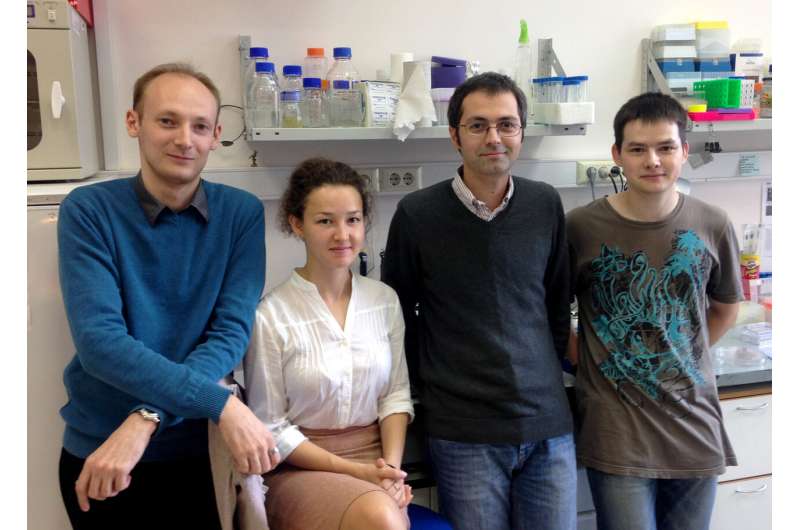Omar Kantidze and his colleagues. Credit: Omar Kantidze
Researchers have discovered that the spatial organization of the genome can be altered using small molecule compounds which are considered as promising anti-cancer drugs. This work opens up the prospect of developing a new class of anticancer epigenetic drugs that alter the 3-D genome. The results were published in Nature Communications.
The properties of a living organism are encoded in its genome, the physical carrier of which in most cases is DNA. Even though DNA is a linear molecule, it is in a folded state in the cell nucleus, which means that genes and distant regulatory elements may be juxtaposed in physical space, forming complex regulatory networks. Special mechanisms controlling the functioning of human genes operate at the level of DNA packaging. These mechanisms comprise the subject of interest for this investigation.
In this work, the scientists were the first to demonstrate that the 3-D organization of the genome can be altered using small molecules capable of penetrating into living cells. Curaxins are a class of chemical compounds that exhibit anticancer activity, i.e., they kill cancer cells and suppress the development of malignant tumours. These anti-cancer agents were developed by the American co-authors of the article approximately 10 years ago. The laboratory of Professor Katerina Gurova (Roswell Park Comprehensive Cancer Center, United States) had previously demonstrated that curaxins can specifically kill cancer cells. A drug from this group is currently undergoing the first phase of clinical trials.
"We used a compound from the curaxin family. It binds to DNA and alters its physical properties in such a way that a protein factor important for maintaining the spatial structure of the genome is detached from the DNA. This leads to significant changes in the 3-D genome, suppressing a number of genes, primarily oncogenes," says supervisor of the research, professor Sergey Razin, head of the Functional Genomics Department at the Institute of Gene Biology of the Russian Academy of Sciences.
"This study could stimulate the search for new drugs that alter gene expression by changing the spatial genome organization," adds one of the article's authors, Omar Kantidze, head of the Genome Stability Lab at the Institute of Gene Biology, RAS.
The search for so-called epigenetic drugs has become a hot research trend. However, no small molecules that directly affect the 3-D genome were previously known. The results of this work outline a new approach to the development of epigenetic drugs.
More information: Omar L. Kantidze et al, The anti-cancer drugs curaxins target spatial genome organization, Nature Communications (2019). DOI: 10.1038/s41467-019-09500-7
Journal information: Nature Communications
Provided by AKSON Russian Science Communication Association
























